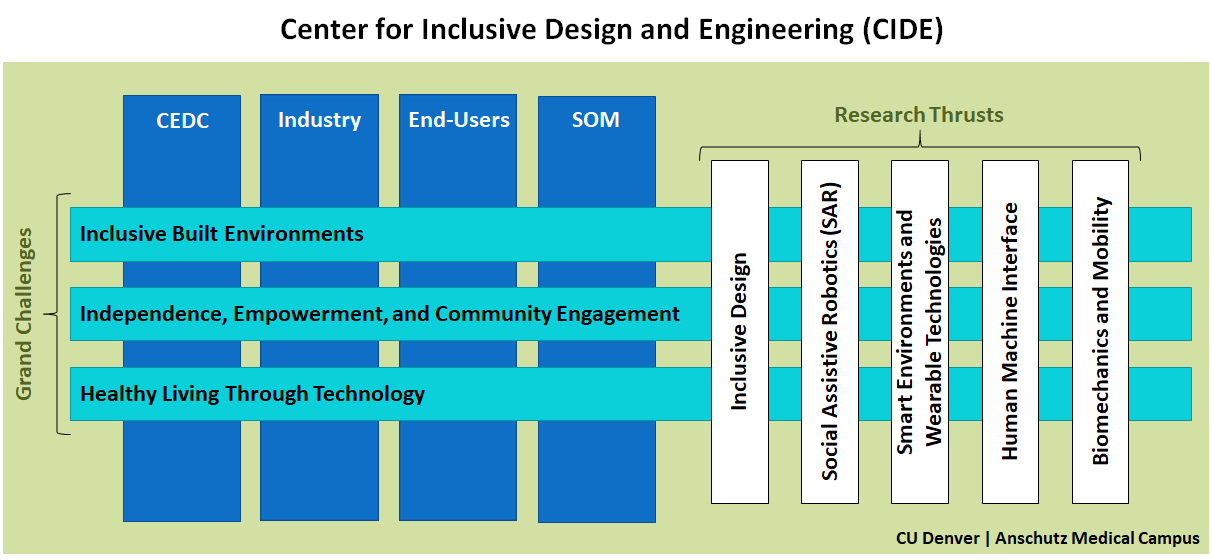About Us
A New Chapter for Assistive Technology Partners
Assistive Technology Partners (ATP) began in 1989 when Colorado was chosen as one of the first nine states to receive Federal funding from the Technology Related Assistance for Individuals with Disabilities and the Elderly Act. From this beginning, ATP has grown from a single project to a multi-faceted program encompassing research, engineering, industry, academics, clinical services and worldwide community engagement. Over the past three decades, inclusive engineering has made significant advancements to improve the quality of people’s lives in a variety of ways—including the lives of persons who have, or are aging into, disabilities.Becoming the Center for Inclusive Design and Engineering (CIDE) is a natural next step, reflecting our growth and continued commitment to driving innovation in the field of inclusive, assistive and health technologies. CIDE is an applied interdisciplinary and human-focused innovation center for engineers, students, clinicians, consumers and entrepreneurs, with our academic home in the Department of Bioengineering (new window). The center creates opportunities for stakeholders to address the myriad challenges experienced by those living with disabilities through technology. Please join us.
More About Who We Are
Our Vision
The Center for Inclusive Design and Engineering (CIDE) envisions a world where all persons with disabilities and, those aging into disability, are engaged in life at home, school, work and play, without barriers and without boundaries through appropriate technology solutions.
Our Mission
The mission of the CIDE is to accelerate applied transdisciplinary technology research and innovation for persons with disabilities and those aging into disability. This includes collaboration with local, state, national and international stakeholders including industry, government, researchers, developers, end-users and their families. The center warmly welcomes actively engaged collaborators, including students, staff, faculty, external partners and the public. The center is defined by the following three core objectives:
- Scholarly: Advance the discipline of inclusive engineering and design through academics, applied clinical technology research, and engineering development.
- Translational: Create, modify and improve technologies for people with disabilities and those aging into disability by bridging clinical and engineering sciences.
- Broad Impacts: Address key societal challenges of aging and disability by partnering with industry, government, engineers, students, families, clinicians, persons with disabilities and the elderly.

Our Structure
More than one billion people now live with some form of disability (10% of the world’s population). The conceptual framework presented above demonstrates the required transdisciplinary collaboration and research thrusts necessary to address the extreme barriers facing persons with disabilities and those aging into disability throughout the world. The center’s mission addresses three grand challenges in the areas of: inclusive built environments; independence, empowerment and community engagement; and, healthy living through technology. Collectively, these challenges represent vital areas of emerging applied clinical and engineering research. Addressing these challenges requires the active engagement of transdisciplinary teams made up of industry partners, students, clinicians, end-users and their families, researchers and engineers.
The Following research priorities are addressed by the center:
Inclusive Design - Existing, emerging and new technologies have the potential to facilitate improved independence for everyone. However, products and services need to be designed in a manner that facilitates inclusion. This research thrust is focused on improving how products are designed and used by everyone.
Social Assistive Robotics (SARs) – SARs are an emerging tool to improve clinical outcomes, decrease social isolation, and facilitate engagement in life activities. This research thrust will focus on developing a SAR platform utilizing a variety of sensors, artificial intelligence and machine learning to create socially engaging therapeutic augmentation tools.
Smart Environments and Wearable Technologies - IoT platforms deliver various kinds of intelligence and data using a variety of sensors, making it possible for devices to function autonomously—enabling the entire system to continuously improve or become smarter every day. New sensors are arriving rapidly. From temperature to proximity, to image and motion detection, these sensors show great promise in improving the execution of activities of daily living (ADLs) for those who need additional assistance. This research thrust is focused on developing applied solutions.
Human Machine Interface – In today’s world, human machine interfaces are tools ranging from simple push buttons, touchscreens, haptics, to brain computer interfaces, bridging the gap between what a human is able to do and what they want to do. This research thrust will explore, evaluate and invent innovative interfaces between humans and machines.
Biomechanics and Mobility – This research thrust examines and augments the mechanics of the human body, from upper limb impairment to limited ambulation. Through the exploration of emerging and new technologies in robotics, exoskeletons, wheelchairs, power-assist hubs and smart drives, as well as autonomous control and navigation, researchers will extend human capabilities.
The execution of the CIDE, while expected to evolve over time, will incorporate strategic research initiatives, existing and emerging collaborations, and primary partnerships within industry and the community. Existing research collaborations with investigators across the CU Anschutz School of Medicine (new window), the College of Engineering, Design and Computing, external university partners and industry groups along with undergraduate and graduate students will form the nucleus of the initial work. An advisory council comprised of business and community leaders will convene as often as monthly with center leadership. The Council will be charged with annually evaluating the Center’s work and with providing feedback on the center’s progress and opportunities for improvement. Dr. Michael Lightner will lead the center's scientific advisory council and will work with the director to solicit leading scientists, engineers and industry partners to actively engage in the work of the center.